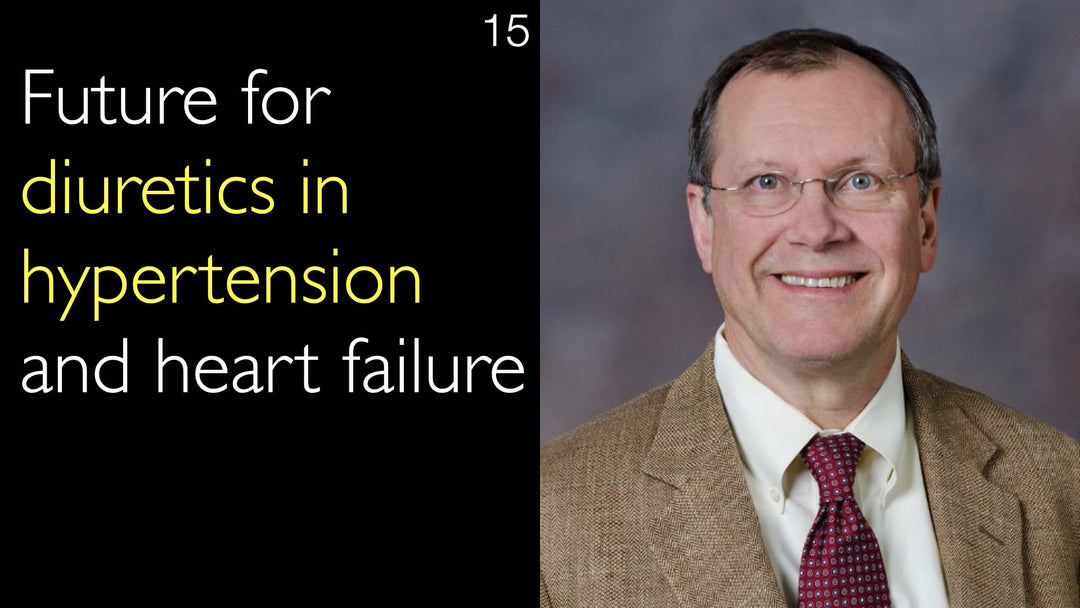高血圧と心不全の専門家、David Ellison医師(医学博士)が、利尿薬の治療における持続的な重要性について解説します。今後10年間のこれらの薬剤の展望についても論じ、フィネレノンなどの新薬開発に注目しています。この非ステロイド性ミネラルコルチコイド受容体拮抗薬は、副作用が少なく、臨床的に有益である可能性があります。また、急性増悪型心不全の予防の必要性を強調し、利尿薬の使用を最適化することが引き続き重要な臨床目標であると指摘しています。
高血圧および心不全治療における利尿薬療法の将来展望
セクションへ移動
利尿薬の不変的な役割
David Ellison医学博士によれば、利尿薬は50年以上にわたり使用され続けており、高血圧と心不全の治療において高い有効性を維持しています。その歴史は古く、薬理学の父と称されるパラケルススも、何世紀も前に水銀を利尿薬として用いていました。Ellison博士は、利尿薬から完全に離れることはなく、将来は新たなアプローチや既存薬剤のより良い活用法が焦点となると確信しています。
フィネレノンの革新性
David Ellison医学博士は、フィネレノンが重要な進歩であると指摘します。この非ステロイド性ミネラルコルチコイド受容体拮抗薬は、従来のステロイド系拮抗薬とは異なる作用機序を持つ可能性があります。Ellison博士は、有益な効果を維持しながら副作用を軽減できる点に期待を示しています。本薬剤は、血管、脳、腎臓を含む全身のアルドステロン作用を標的としています。
高カリウム血症の課題
高カリウム血症は、ミネラルコルチコイド受容体拮抗薬の主要な副作用です。David Ellison医学博士は、この副作用のために多くの患者が治療を受けられない現状を指摘します。現在の対策として腸管内でカリウムを吸着する薬剤が用いられていますが、Ellison博士はこれを根本解決ではなく対症療法と位置づけます。将来的には、フィネレノンのように特定臓器の受容体を選択的に遮断し、高カリウム血症リスクを低減しながら治療効果を維持できる薬剤の開発が期待されます。
利尿薬使用の最適化
David Ellison医学博士は、利尿薬の使用法にはまだ改善の余地が大きいと強調します。これらの薬剤は約1世紀にわたり使用されてきましたが、適用方法を工夫することで、心不全と高血圧患者の転帰をさらに向上させられると考えられます。Ellison博士は、循環器学の文献で続く利尿薬離脱の議論に言及しつつも、離脱が可能な患者の大多数はもともと軽度の心不全であった点を注記しています。
心不全代償不全の予防
急性増悪型心不全の予防は、将来の重要な目標です。David Ellison医学博士は、入院が必要となる前の段階での介入の重要性を強調します。より良い管理により、心不全患者の入院率を減少させられると確信しています。Ellison博士は、体内の代償性変化を最小限に抑えつつ、利尿薬を用いた患者安定化戦略を提唱します。このアプローチは、短期的な対処ではなく、長期的な安定性に焦点を当てるべきです。
将来の治療方向性
David Ellison医学博士は、利尿薬療法の将来像を展望します。目標は、利尿効果の利益を副作用なく達成することにあります。ミネラルコルチコイド受容体を選択的に標的化できる薬剤に可能性を見出し、将来的には高カリウム血症を引き起こさずに心臓や脳の受容体を遮断する薬剤の開発が期待されます。Ellison博士は、急性代償不全の予防を主要な焦点とすべきと結論づけ、このアプローチが心不全と高血圧治療の最も有望な将来像を代表すると考えています。
全文書き起こし
Anton Titov医学博士: Ellison教授、高血圧と心不全の治療における利尿薬使用の将来展望についてお聞かせください。貴方はこれら二つの複雑な疾患の交差点における著名な専門家です。今後5~10年でどのような展開が予想されますか?
David Ellison医学博士: まず、50年以上にわたり、利尿薬からの脱却が望まれてきましたが、現在も使用され続けています。その理由は、非常に有効だからです。利尿薬は古代から用いられ、薬理学の父と呼ばれるパラケルススも、何百年も前に水銀を浮腫治療の利尿薬として使用していました。
ですから、これらの疾患の治療から利尿薬が消えることはないと思います。むしろ、新たなアプローチや新しい使用方法を見いだす方向に進むでしょう。
まず注目すべきは、新薬フィネレノンの概念です。これは非ステロイド性ミネラルコルチコイド受容体拮抗薬で、他のステロイド系拮抗薬とは異なり、異なる作用機序を持つ可能性が示唆されています。
アルドステロンは全身に作用し、血管や脳、腎臓など多様な効果をもたらします。副作用は主に腎臓に現れ、我々が懸念するのは高カリウム血症です。
David Ellison医学博士: ミネラルコルチコイド受容体拮抗薬の適応となる多くの患者は、高カリウム血症を発症するため使用できません。現在は腸管内でカリウムを吸着する薬剤で対応していますが、これは根本的な解決策ではなく回避策に過ぎません。
フィネレノンには異なる特性があり、有益な効果をより多くもたらしつつ副作用を軽減する可能性があります。仮にフィネレノンが達成できなくても、後続の薬剤では、心臓や脳のミネラルコルチコイド受容体を遮断しつつ、高カリウム血症を引き起こさないようにできるかもしれません。
ですから、利尿の有益な部分を副作用なく得る方法を見いだすことが極めて重要です。第二に、ほぼ100年間使用されてきたこれらの薬剤を、より効果的に使用する余地が大いにあると考えます。
心不全へのアプローチに関しては、急性増悪型心不全の発症予防と入院患者への対応を改善する必要があります。循環器学の文献では、心不全患者から一時的に利尿薬を離脱させる有用性について議論が続いています。
利尿薬から離脱可能な患者も一部存在し、これに関心が寄せられてきました。しかし、これらの患者における長期的転帰の真の改善は実証されていません。一部の患者が利尿薬なしでも良好に経過し得ることは示されていますが、これらの患者の大多数はもともと比較的軽度の心不全です。
有害な代償性変化を引き起こさずに利尿薬を継続する方法を見いだすという考え方は非常に魅力的であり、焦点を当てるべき課題です。したがって心不全では、急性代償不全に至る前の予防に重点を置くべきであり、ここに将来の可能性があると考えます。




